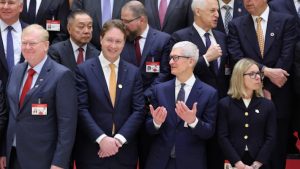Asian stocks surged to a two-and-a-half year high on Tuesday after Beijing rolled out a slew of stimulus measures to help kickstart its wobbly economy.
Investors across the region were heartened by the Chinese announcements while expectations for more US rate cuts also kept risk sentiment aloft and the dollar under pressure.
In an eagerly awaited press conference, China’s top financial regulators unveiled a range of measures, saying it would cut bank reserves by 50 basis points while reducing mortgage rates to try to spur sluggish economic growth.
That saw Chinese stocks jump, the yuan leap and bonds rally – and its main indexes notch up their biggest one-day percentage gains in more than two years.
Also on AF: Online Misinformation Harming Climate Change Effort: UN Chief
China’s CSI300 blue-chip index was up 4.33%, while the Shanghai Composite Index soared 4.15%, or 114.21 points, to 2,863.13. The Shenzhen Composite Index on China’s second exchange advanced 3.95%, or 59.15 points, to 1,555.98.
Chinese bonds rallied in an initial knee-jerk reaction to the larger-than-expected rate cuts, though pared those gains over the course of the trading day as investors cashed in their profits.
The benchmark 10-year government bond yield bottomed at 2.036%, close to the record low hit last week, before trading roughly one basis point higher at 2.06%. Bond yields move inversely to prices.
Shares of property companies in Hong Kong and China similarly saw strong gains, thanks to cuts to existing mortgage rates. The Hang Seng Index surged 4.13%, or 753.45 points, to 19,000.56.
The world’s second-largest economy is battling deflationary pressures and struggling to lift growth despite a series of policy measures aimed at spurring domestic spending, with its beleaguered property sector also remaining a huge drag.
Faltering Chinese economic activity has prompted global brokerages to scale back their 2024 China growth forecasts to below the government’s official target of about 5%.
BoJ Holds Rates
Also on Tuesday, the PBOC said China will roll out two structural monetary policy tools for the first time to help stabilise the country’s capital market.
Japan’s Nikkei share average rose to a three-week closing high as markets resumed trade after a long holiday weekend, with Wall Street’s overnight gains and the Bank of Japan’s dovish comments last week lifting investor sentiment.
The Nikkei ended 0.57% higher at 37,940.59, its highest close since September 3. The broader Topix was ahead 0.54%, or 14.38 points, to 2,656.73.
Electronic component maker TDK jumped 4.21% and was the biggest boost for the Nikkei. Chip-making equipment maker Tokyo Electron erased early gains to fall 0.93%, weighing on the Nikkei the most.
The BOJ kept interest rates steady on Friday and its governor said the central bank could afford to spend time eyeing the fallout from global economic uncertainties, signalling it was in no rush to raise borrowing costs further.
Indian stocks advanced with Mumbai’s signature Nifty 50 index up 0.15%, or 37.65 points, at 25,976.70. MSCI’s broadest index of Asia-Pacific shares outside Japan was 0.92% higher, at a level last seen in April 2022.
European stock markets were set for a stronger open, with Eurostoxx 50 futures and German DAX futures 0.5% higher, while FTSE futures was up 0.355.
US Dollar Index Dips
Overnight, US stocks closed modestly higher as traders continued to digest the Fed’s big move, with policymakers explaining the need for the 50 bp cut.
Meanwhile, the Reserve Bank of Australia held interest rates steady as expected and reiterated that policy needed to stay tight in contrast to the Federal Reserve.
Markets are currently evenly split on whether the US central bank will go for another 50 bp cut or a 25 bp cut in November, the CME Fedwatch tool showed. They are pricing in 76 bps of easing this year.
The dollar index, which measures the US currency against six rivals, was at 100.95, not far from the one-year low of 100.21 touched last week.
In commodities, oil prices rose, with Brent crude futures up 0.92% at $74.58 a barrel, while US crude futures climbed 1% to $71.14. Oil prices slid on Monday on demand worries as well as weak economic data from Europe.
Gold prices hit a record high of $2,637.79 as escalating tensions in the Middle East drew safe-haven flows.
Key figures
Tokyo – Nikkei 225 > UP 0.57% at 37,940.59 (close)
Hong Kong – Hang Seng Index > UP 4.13% at 19,000.56 (close)
Shanghai – Composite > UP 4.15% at 2,863.13 (close)
London – FTSE 100 > UP 0.39% at 8,292.15 (0935 BST)
New York – Dow > UP 0.15% at 42,124.65 (Monday close)
- Reuters with additional editing by Sean O’Meara
Read more:
Hang Seng Flat, China Stocks Edge Ahead on Policy Bets
China’s PBOC Cuts Short-Term Rate, to Discuss Outlook Tuesday
Green Investment Hindered by Poor Demand For Low-Carbon Products
Nikkei Lifted by Tech Gains, Hang Seng Rallies on Rate Boost
























